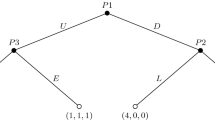Abstract
Inspired by Scarf (J Econ Theory 3: 169–181, 1971), Zhao (Int J Game Theory 28: 25–34, 1999), Sandholm (Population games and evolutionary dynamics. MIT Press, Cambridge, 2010) and Yang and Zhang (Optim Lett. https://doi.org/10.1007/s11590-018-1303-5, 2018), we introduce the model of coalitional population games with infinitely many pure strategies, and define the notions of NTU core and TU core for coalitional population games. We next prove the existence results for NTU cores and TU cores. Furthermore, as an extension of the NTU core, we introduce the notion of strong equilibria and prove the existence theorem of strong equilibria.
Similar content being viewed by others
References
Aliprantis, C., & Border, K. C. (2006). Infinite dimensional analysis (3rd ed.). Berlin: Springer.
Askoura, Y. (2011). The weak-core of a game in normal form with a continuum of players. Journal of Mathematical Economics, 47, 43–47.
Askoura, Y., Sbihi, M., & Tikobaini, H. (2013). The ex ante \(\alpha \)-core for normal form games with uncertainty. Journal of Mathematical Economics, 49, 157–162.
Askoura, Y. (2015). An interim core for normal form games and exchange economics with incomplete information. Journal of Mathematical Economics, 58, 38–45.
Askoura, Y. (2017). On the core of normal form games with a continuum of players. Mathematical Social Science, 89, 32–42.
Aumann, R. J. (1961). The core of a cooperative game without side payments. Transactions of the American Mathematical Society, 98, 539–552.
Ichiishi, T. (1981). A social coalitional equilibrium existence lemma. Econometrica, 49, 369–377.
Kajii, A. (1992). A generalization of Scarf’s theorem: An \(\alpha \)-core existence theorem without transitivity or completeness. Journal of Economic Theory, 56, 194–205.
Nash, J. (1950a). Equilibrium points in n-person games. Proceedings of the National Academy of Sciences, 36, 48–49.
Nash, J. (1950b). Noncooperative games. Dissertation, Princeton University, Dept. Mathematics, Princeton.
Nessah, R., & Tian, G. Q. (2014). On the existence of strong Nash equilibria. Journal of Mathematical Analysis and Applications, 414, 871–885.
Noguchi, M. (2014). Cooperative equilibria of finite games with incomplete information. Journal of Mathematical Economics, 55, 4–10.
Noguchi, M. (2018). Alpha cores of games with nonatomic asymmetric information. Journal of Mathematical Economics, 75, 1–12.
Sandholm, W. H. (2010). Population games and evolutionary dynamics. Cambridge: MIT Press.
Scarf, H. F. (1971). On the existence of a cooperative solution for a general class of n-person games. Journal of Economic Theory, 3, 169–181.
Uyanik, M. (2015). On the nonemptiness of the \(\alpha \)-core of discontinuous games: Transferable and nontransferable utilities. Journal of Economic Theory, 158, 213–231.
Walters, P. (2003). An introduction to Ergodic theory. Berlin: Springer.
Yang, G. H., & Yang, H. (2017). Stability of weakly Pareto-Nash equilibria and Pareto-Nash equilibria for multiobjective population games. Set-Valued and Variational Analysis, 25, 427–439.
Yang, Z. (2017). Some infinite-player generalizations of Scarf’s theorem: Finite-coalition \(\alpha \)-cores and weak \(\alpha \)-cores. Journal of Mathematical Economics, 73, 81–85.
Yang, Z. (2018). Some generalizations of Kajii’s theorem to games with infinitely many players. Journal of Mathematical Economics, 76, 131–135.
Yang, Z., & Zhang, H. Q. (2018). Essential stability of cooperative equilibria for population games. Optimization Letters,. https://doi.org/10.1007/s11590-018-1303-5.
Zhao, J. (1999). The existence of TU \(\alpha \)-core in normal form games. International Journal of Game Theory, 28, 25–34.
Author information
Authors and Affiliations
Corresponding author
Additional information
Publisher's Note
Springer Nature remains neutral with regard to jurisdictional claims in published maps and institutional affiliations.
This research was supported by National Social Science Foundation of China (No. 16XJY021), National Natural Science Foundation of China (No. 11501349), Graduate Innovation sponsored by Shanghai University of Finance and Economics (No. CXJJ-2018-355), and the SUFE Theoretical Economics Gaofeng II Discipline Innovation Project (No. 2018110721).
Rights and permissions
About this article
Cite this article
Yang, Z., Zhang, H. NTU core, TU core and strong equilibria of coalitional population games with infinitely many pure strategies. Theory Decis 87, 155–170 (2019). https://doi.org/10.1007/s11238-019-09701-y
Published:
Issue Date:
DOI: https://doi.org/10.1007/s11238-019-09701-y




